constipation support
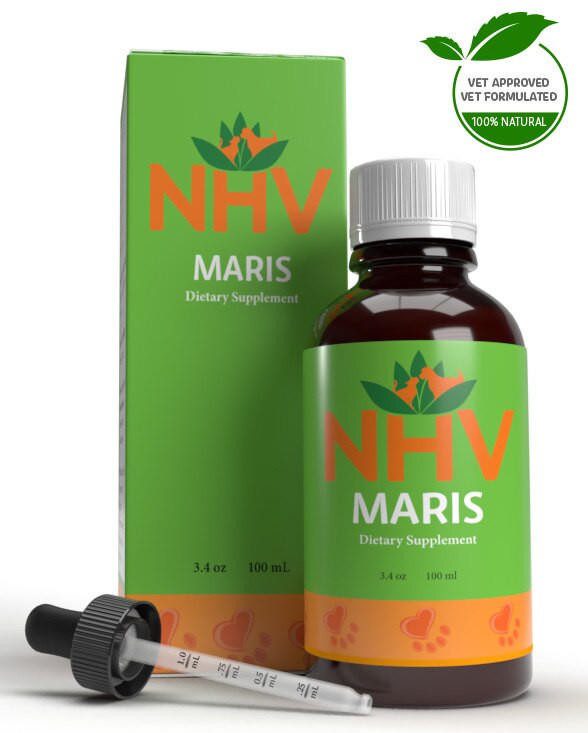
free shipping over $100 (USA & Canada)
1-877-937-4372 the pet expert hotline
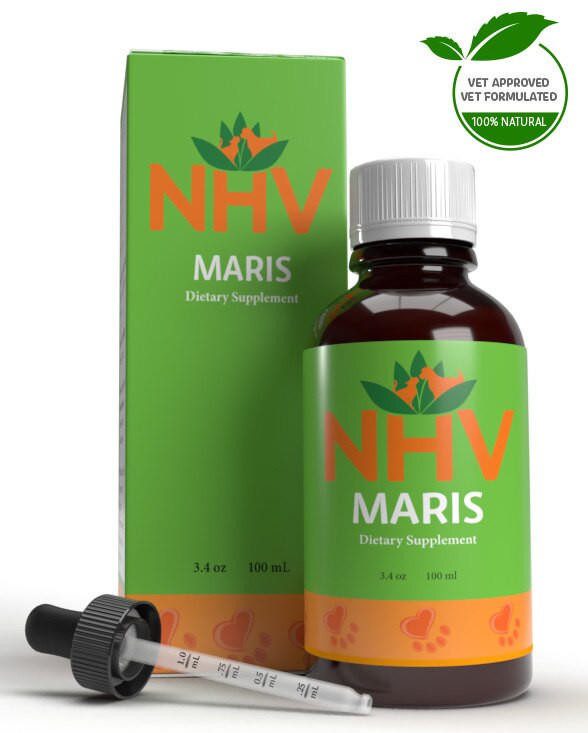
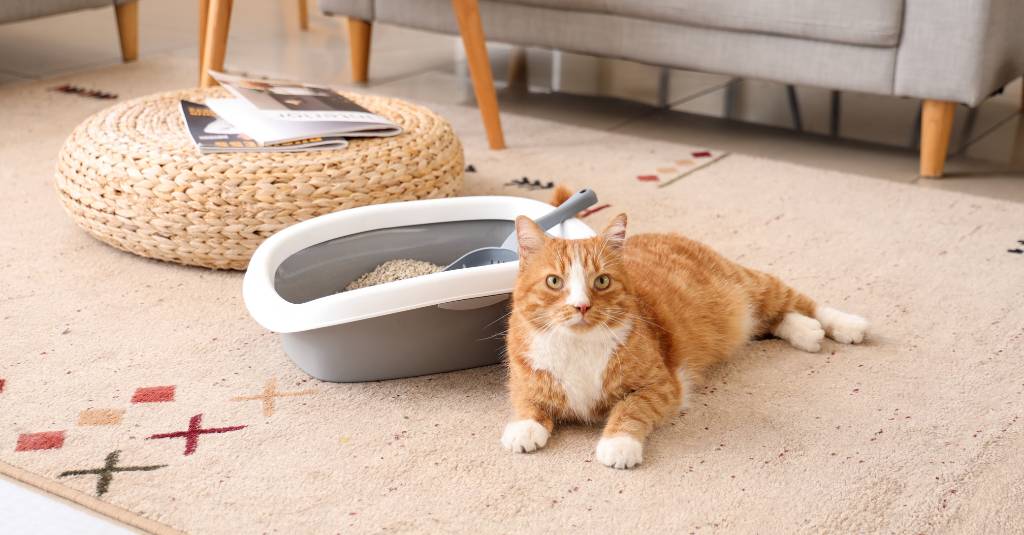
Constipation in pets is a common reason for pet owners to seek veterinary care. Constipation occurs when they have infrequent and difficult bowel movements, resulting in very dry, hard stools due to prolonged fecal stasis in the colon. Obstipation refers to severe and persistent constipation, while megacolon involves generalized distension and loss of motility in the colon.
Constipation and obstipation can affect animals of any age, breed, or sex because the causes are very diverse.
Constipation can result from various diseases affecting the colon, leading to delayed transit of feces and absorption of excess water and salts. It can be linked to pain or difficulty during defecation, causing the dog to avoid bowel movements, which worsens the condition over time.
Constipation and obstipation can also result from spinal cord injuries, paraplegia, and nerve damage that affect the region and compromise the activity of the smooth intestinal muscles.
Endocrine disorders, such as hypothyroidism, and electrolyte imbalances, like hypercalcemia, hypokalemia, and dehydration, can also cause intestinal constipation. Medications such as opioids, aluminum hydroxide, sucralfate, and anticholinergics can have constipation as a side effect.
Dogs of different sizes and breeds have distinct physiological characteristics that can impact their likelihood of experiencing constipation. Small dogs are prone to constipation due to their digestive traits, such as a shorter intestinal fermentation time and a longer intestinal length relative to body weight.
Obstruction caused by parasites, neoplasms, prostate problems, hair, or foreign bodies may hinder the normal passage of feces, leading to constipation.
Constipation and obstipation can affect animals of any age, breed, or sex because the causes are very diverse.
Signs of constipation include straining to defecate and passing firm, dry feces. Some pets may also show signs of illness such as lethargy, depression, loss of appetite, vomiting, and abdominal discomfort.
If you notice these symptoms, take your pet to the veterinarian, and inform them if your pet eats bones, litter, or other hard objects.
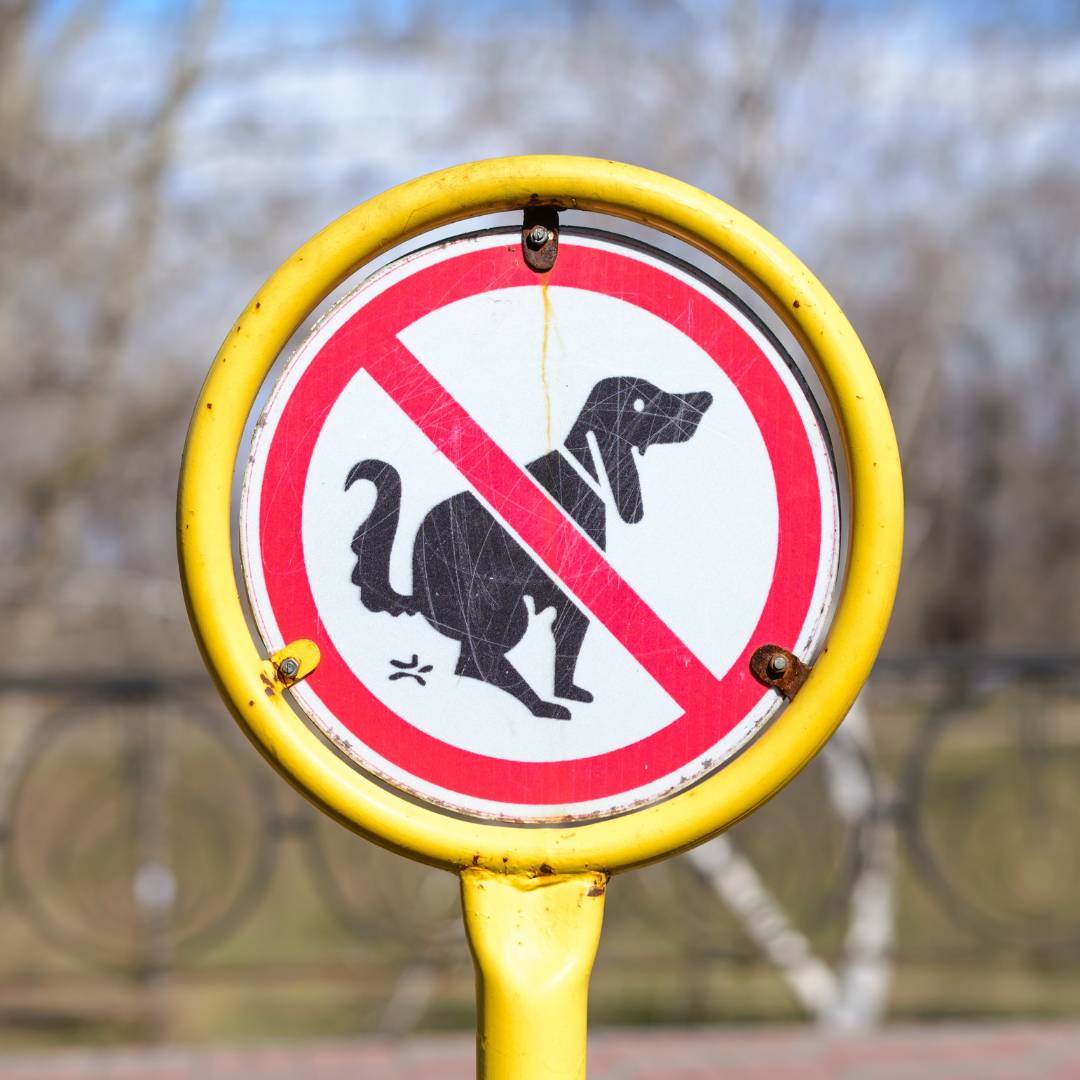
During diagnosis, veterinarians consider factors such as medications, diet, environment, and behavior. They may conduct fecal examinations, physical and rectal examinations, and blood tests. Additionally, they might perform abdominal X-rays and a rectal exam, and conduct further tests as needed, such as ultrasonography, and colonoscopy to identify the underlying causes.
Initial treatment focuses on symptomatic relief, but uncovering the root cause is important to prevent irreversible issues. Surgery may be necessary in cases of obstructive or compressive lesions or when conservative measures fail.
In more severe instances, a veterinarian may be required to employ enemas or manual extraction under general anesthesia to eliminate retained fecal matter. If they are suffering from persistent constipation or megacolon does not exhibit improvement with standard medical treatments, surgical excision of the affected portion of the large intestine may be warranted.
It is important to provide both cats and dogs with additional integrative support, such as a diet that promotes maximum digestibility and nutrient absorption, and natural supplements to support their gastrointestinal health.
To manage mild constipation, switch to a high-fiber diet, prevent your pet from consuming bones or other objects, make sure water is readily available, and create more opportunities for defecation and natural supplements to support this condition.
Avoid using human laxatives, as they can be harmful to pets. Use only veterinarian prescribed laxatives, and be sure to follow their instructions carefully.
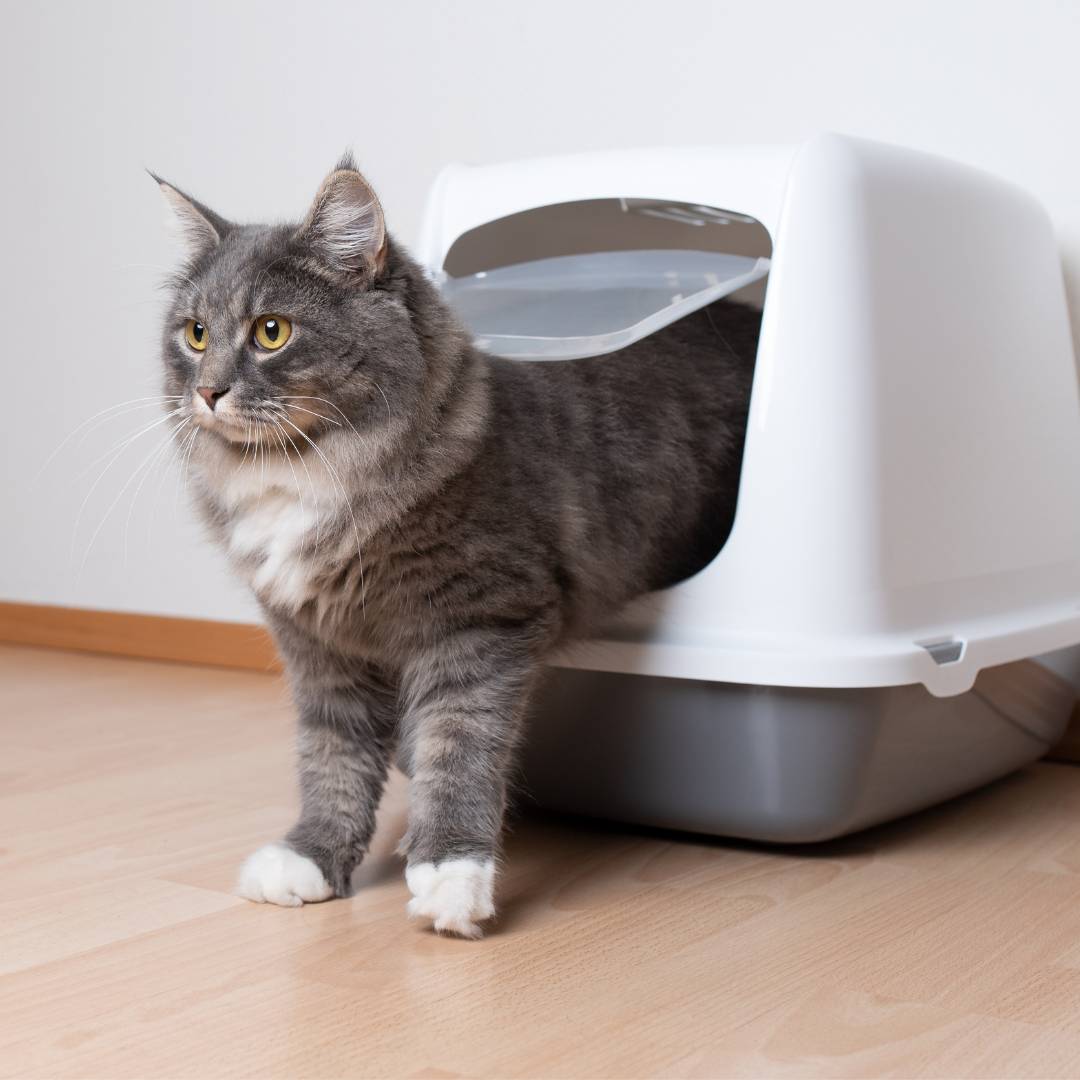
NHV Maris is an herbal supplement that has laxative properties and can help with constipation in pets. It works by creating softer stool, which makes bowel movements easier and reduces strain. Maris also promotes healthy movement through the colon by stimulating bile flow and lubricating irritated digestive tissues.
NHV TumFlora is a supplement that may help reduce inflammation of the gastrointestinal tract and improve natural intestinal flora in pets. It can be beneficial for easing symptoms associated with gastrointestinal issues, such as inflammation of the GI tract. TumFlora also has antibacterial properties and may aid with blood in the stool, and lethargy.
NHV Probiotics & Prebiotics may also be handy. Probiotics are live microorganisms, such as bacteria and yeast, that can potentially restore the natural microorganisms in a healthy gut. They are crucial in supporting the digestive tract and addressing digestive problems like Inflammatory bowel disease (IBS), diarrhea, and constipation. Prebiotics, on the other hand, are substances that provide nourishment for the beneficial bacteria in the gut.
constipation support

Natural Remedy for Cat Constipation
buy 2 and save $3
3 month supply for a small to medium size pet
What is it?
NHV Maris is a gentle, vet-formulated supplement for cat constipation that helps promote soft stools, supports gastrointestinal function, and encourages long-term colon health.
How Does it Work?
Why Should I Trust It?
Vet-approved and vet-formulated natural remedy for cat.

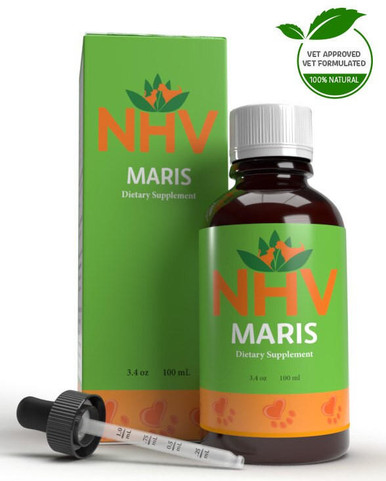
What is it?
NHV Maris is a gentle, vet-formulated supplement for cat constipation that helps promote soft stools, supports gastrointestinal function, and encourages long-term colon health.
How Does it Work?
Why Should I Trust It?
Vet-approved and vet-formulated natural remedy for cat.

What to do for a cat with constipation? It can be a real messy situation, and long term constipation can cause serious health issues for your cat including megacolon in cats. You can help relieve your cat’s constipation with natural remedies formulated by vets. Promote healthy bowel movements with Maris, a gentle, herbal supplement that will soothe your pet’s intestines, soften stools, and help relieve cramps and gas.
Constipation occurs when a pet is unable to evacuate his or her bowels. When this occurs, water from fecal matter is absorbed by the colon, leaving a hard mass that is uncomfortable to pass.
Constipation may be caused by poor hydration or a dirty litter pan. Start by ensuring that your cat has easy access to clean drinking water and a clean litter box. Diet is another common factor. They may have ingested animal bones or other indigestible materials, like hair, certain plants, or litter.
Other possible causes may include:
Constipation may be a sign of a more serious condition, such as inflammation of the colon, called colitis. If your kitty’s constipation is recurring, it’s important to schedule a visit with your vet to rule this out.
Maris is an effective remedy to soothe the discomfort and symptoms of constipation naturally. Maris is a gentle herbal formula that can be used long term if your kitty suffers from constipation. For immediate, emergency relief of constipation please see your vet. All NHV supplements are ethically sourced or wildcrafted. They’re formulated by a holistic veterinarian to support your cat’s overall health. Have your cat try Maris and see the difference for yourself.
If your kitty is suffering from chronic constipation, ask your vet to show you how to palpate for constipation. This little trick along with supplements can save you a trip to the vet’s since it can help ease constipation before it gets too severe.
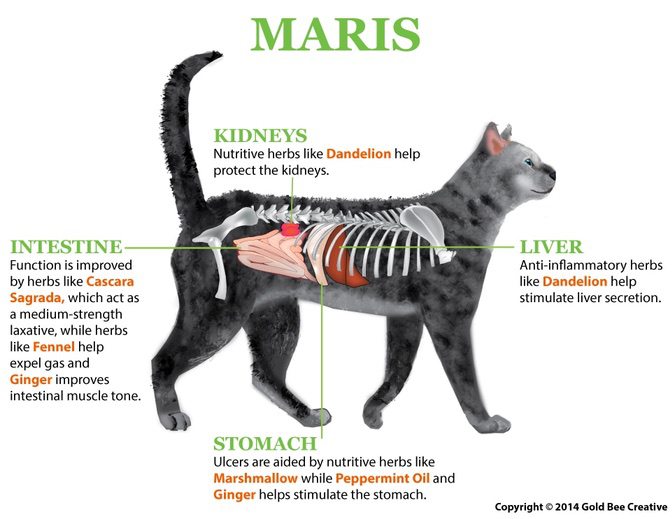
Cascara Sagrada – A medium-strength laxative that restores intestinal tone and muscle activity without cramping.
Marshmallow – Controls bacterial infection and soothes and softens irritated tissue. It has a soothing lubricating effect on the intestine.
Fennel – Relieves stomach cramps and reduces gas production.
Eleuthero – Reduces fatigue and leaves your pet feeling more energetic.
Dandelion – A vitamin-rich laxative that protects the liver and improves digestion. It also has anti-inflammatory properties.
Ginger – An antispasmodic and anti-flatulent that improves peristalsis and intestinal muscle tone.
Peppermint Oil – Relieves spasms, improves digestion, and helps your pet eliminate gas.
Select your pet's weight to determine the correct dose.
To be taken twice daily. Determine your pet’s weight and then use the easy chart below to determine the correct dose. This is the minimum dosage.
Pet's Weight Dosage
0 - 15 lb = 0.5 ml
16 - 30 lb = 1.0 ml
31 - 45 lb = 1.5 ml
46 - 60 lb = 2.0 ml
61 - 75 lb = 2.5 ml
Over 75 lb = 3.0 ml
How to Administer
Shake well before use. The easiest method is to use the dropper provide and places the drops into your pet’s food or favorite treat. You can also use the dropper and squirt directly into the pet’s mouth.
Some pets can be finicky, if this occurs consider hiding the drops in foods most pet’s love such as fish, chicken or yogurt or a favorite treat. If your pet only eats dry food then soak a few kibbles at feeding time.
For Best Results
Herbal dietary supplements are beneficial to the health and wellbeing of your pet and are safe for long-term use. Every pet responds to natural herbal supplements differently, therefore it is important to be consistent and administer the product daily. Supplements generally take two to four weeks to take effect, however this will vary from one animal to the next.
Product Storage
All NHV Natural Pet Products are pure herbal extracts and contain no artificial additives, preservatives or coloring. Shelf life after opening is 6 months and must be refrigerated after opening.
Cautions and Contraindications
Do not use Maris in pregnant or nursing animals. Do not use with intestinal obstructions. Speak to your vet before using our products. A second visit is recommended if your pet’s condition does not improve, or deteriorates after continued use of the supplements.
All information provided by NHV Natural Pet Products is for educational purposes only.
What to do for a cat with constipation? It can be a real messy situation, and long term constipation can cause serious health issues for your cat including megacolon in cats. You can help relieve your cat’s constipation with natural remedies formulated by vets. Promote healthy bowel movements with Maris, a gentle, herbal supplement that will soothe your pet’s intestines, soften stools, and help relieve cramps and gas.
Constipation occurs when a pet is unable to evacuate his or her bowels. When this occurs, water from fecal matter is absorbed by the colon, leaving a hard mass that is uncomfortable to pass.
Constipation may be caused by poor hydration or a dirty litter pan. Start by ensuring that your cat has easy access to clean drinking water and a clean litter box. Diet is another common factor. They may have ingested animal bones or other indigestible materials, like hair, certain plants, or litter.
Other possible causes may include:
Constipation may be a sign of a more serious condition, such as inflammation of the colon, called colitis. If your kitty’s constipation is recurring, it’s important to schedule a visit with your vet to rule this out.
Maris is an effective remedy to soothe the discomfort and symptoms of constipation naturally. Maris is a gentle herbal formula that can be used long term if your kitty suffers from constipation. For immediate, emergency relief of constipation please see your vet. All NHV supplements are ethically sourced or wildcrafted. They’re formulated by a holistic veterinarian to support your cat’s overall health. Have your cat try Maris and see the difference for yourself.
If your kitty is suffering from chronic constipation, ask your vet to show you how to palpate for constipation. This little trick along with supplements can save you a trip to the vet’s since it can help ease constipation before it gets too severe.

Cascara Sagrada – A medium-strength laxative that restores intestinal tone and muscle activity without cramping.
Marshmallow – Controls bacterial infection and soothes and softens irritated tissue. It has a soothing lubricating effect on the intestine.
Fennel – Relieves stomach cramps and reduces gas production.
Eleuthero – Reduces fatigue and leaves your pet feeling more energetic.
Dandelion – A vitamin-rich laxative that protects the liver and improves digestion. It also has anti-inflammatory properties.
Ginger – An antispasmodic and anti-flatulent that improves peristalsis and intestinal muscle tone.
Peppermint Oil – Relieves spasms, improves digestion, and helps your pet eliminate gas.
Select your pet's weight to determine the correct dose.
To be taken twice daily. Determine your pet’s weight and then use the easy chart below to determine the correct dose. This is the minimum dosage.
Pet's Weight Dosage
0 - 15 lb = 0.5 ml
16 - 30 lb = 1.0 ml
31 - 45 lb = 1.5 ml
46 - 60 lb = 2.0 ml
61 - 75 lb = 2.5 ml
Over 75 lb = 3.0 ml
How to Administer
Shake well before use. The easiest method is to use the dropper provide and places the drops into your pet’s food or favorite treat. You can also use the dropper and squirt directly into the pet’s mouth.
Some pets can be finicky, if this occurs consider hiding the drops in foods most pet’s love such as fish, chicken or yogurt or a favorite treat. If your pet only eats dry food then soak a few kibbles at feeding time.
For Best Results
Herbal dietary supplements are beneficial to the health and wellbeing of your pet and are safe for long-term use. Every pet responds to natural herbal supplements differently, therefore it is important to be consistent and administer the product daily. Supplements generally take two to four weeks to take effect, however this will vary from one animal to the next.
Product Storage
All NHV Natural Pet Products are pure herbal extracts and contain no artificial additives, preservatives or coloring. Shelf life after opening is 6 months and must be refrigerated after opening.
Cautions and Contraindications
Do not use Maris in pregnant or nursing animals. Do not use with intestinal obstructions. Speak to your vet before using our products. A second visit is recommended if your pet’s condition does not improve, or deteriorates after continued use of the supplements.
All information provided by NHV Natural Pet Products is for educational purposes only.
IBD support for dogs


Natural Support for IBD in dogs
buy 2 and save $3
3 month supply for a small to medium size pet.
What is it?
NHV’s TumFlora is a unique vet formulation that contains 100% natural ingredients known to help improve intestinal flora and helps to reduce inflammation of the gut.
How does it work?
Why should I trust it?
NHV supplements are vet-formulated and vet-approved.


What is it?
NHV’s TumFlora is a unique vet formulation that contains 100% natural ingredients known to help improve intestinal flora and helps to reduce inflammation of the gut.
How does it work?
Why should I trust it?
NHV supplements are vet-formulated and vet-approved.

Is your furkiddo vomiting, having watery poops or is too tired to play? They may be suffering from a common gastrointestinal issue in dogs known as Inflammatory Bowel Disease (IBD in dogs).
Like humans, Inflammatory or Irritable Bowel Disease, also known as IBD, is a common gastrointestinal problem in dogs. When your furbaby has IBD, inflammatory cells within their body begin to invade the gastrointestinal (GI) tract. The stomach, small intestine, and large intestine are all part of the GI tract. Once inflammatory cells start to take over the GI tract, a thickening of the intestinal wall can occur, upsetting daily functions like absorption and the movement of food (peristalsis). There is no clear cause for IBD in dogs, but studies show that genetic and external factors can predispose your pet to have IBD. Some additional contributing factors may be chronic irritation of the intestines caused by constant vomiting and diarrhea, food allergies, parasites, and autoimmune disorders.
How TumFlora Supports GI Tract Health
TumFlora is a natural herbal vet formulation designed to help improve intestinal flora. In addition to helping improve intestinal flora, and helping with inflammation of the digestive tract, TumFlora contains herbs that are highly nutritious like slippery elm to further help your furbaby heal. Slippery elm is high in vitamins and minerals such as vitamin A, B complex, C, K, calcium, magnesium and sodium. The gentle defense against microorganisms and anti-fungal properties of herbs like oregon grape aid the body to fight off infections. Finally, herbs like fennel and chamomile help to relieve stomach cramps and indigestion and help with overall discomfort.
This soothing liquid formulation is easy to administer and helps maintain a healthy gut. In addition to helping IBD in dogs, TumFlora is also useful for pets suffering from food allergies, gastrointestinal ulcers and bacterial, gut infections. TumFlora is also a great addition to your pet’s daily regimen as a proactive approach for a healthy gut.
Symptoms of IBD in dogs
Dogs will occasionally vomit or have diarrhea because something doesn’t sit right with their tummies, or maybe they ate too much or too little that day. But if your furkiddo begins to vomit and their poops are runny on a regular basis then it could be IBD. Keep your eye out for these additional symptoms:
Typically your vet will do a full-body exam, check your dog’s history, conduct a blood panel, take a stool sample, and possibly opt for x-rays and/or an ultrasound. IBD in dogs can be tough to diagnose because your vet will have to check for a variety of conditions as well as vital organ functions before they can confirm diagnosis. Other health conditions that have similar symptoms to IBD are GI parasites, kidney or liver disease, pancreatitis, cancer, or foreign substances and objects in the intestines. To confirm IBD, your vet may eventually conduct a biopsy on your pup's stomach and/or intestinal tract.
Additional Holistic Support for Inflammatory Bowel Disease in Dogs
A combination of vet-prescribed medication and nutritional therapy is often recommended to alleviate symptoms of inflammatory bowel disease. If your pet is prone to inflammatory bowel disease in dogs, changing your dog’s diet to a more gut-friendly one is recommended. Click here, if you would like a personalized nutrition plan tailored to your pet's unique needs.
At NHV, we are a team of holistic veterinarians, pet experts, and animal enthusiasts. Get in touch with us if you have any questions or concerns about your pup’s GI tract health or need extra support.
Made with the finest, organically grown, or ethically harvested herbs. Made specifically for pets, vet-formulated, and vet approved.
Ashwagandha also known as Indian ginseng has a long history of use for its anti-inflammatory properties and ability to defend against microogranisms. It may help with anxiety and stress, immune support, and promote healthy cholesterol and blood sugar levels.
Boswellia a.k.a. Indian frankincense has effective discomfort relieving and anti-inflammatory properties which may be beneficial for alleviating symptoms of inflammatory bowel disease in dogs, asthma, and osteoarthritis.
Chamomile has been used as a digestive tonic for centuries to soothe and heal the digestive tract. It is an excellent calming agent with anti-inflammatory, analgesic, antispasmodic, and sedative properties to soothe chronic or acute gastric disorders and IBD in dogs.
Fennel's nutrient dense properties are especially beneficial for digestive problems, relaxing spasms, relieving cramps, and helping to restore appetite.
Indian Gooseberry has been used for over millennia in Ayurvedic medicine to help alleviate symptoms of heartburn, diarrhea, and nausea.
Licorice is an herb with an affinity for the digestive, respiratory, and endocrine systems. It helps to cleanse the blood, lubricate and protect mucous membranes, and ease tissue damage in the upper digestive tract.
Marshmallow is a mucilaginous herb whose anti-inflammatory and diuretic properties help to soothe and soften irritated tissues. It is beneficial for gastroenteritis, peptic and duodenal ulceration, ulcerative colitis, and enteritis.
Oregon Grape is an anti-parasitic tonic that helps combat various forms of fungal and bacterial infections. It helps to relieve indigestions and malabsorption.
Slippery Elm supports eliminating toxins and waste by lubricating the digestive tract. It is a rich source of vitamins (A, B complex, C, K) and minerals (calcium, magnesium, and sodium). It may help alleviate symptoms of gastritis, colitis, and diarrhea.
Select your pet's weight to determine the correct dose.
To be taken twice daily. Determine your pet’s weight and then use the easy chart below to determine the correct dose. This is the minimum dosage.
Pet's Weight Dosage
0 - 15 lb = 0.5 ml
16 - 30 lb = 1.0 ml
31 - 45 lb = 1.5 ml
46 - 60 lb = 2.0 ml
61 - 75 lb = 2.5 ml
Over 75 lb = 3.0 ml
How to Administer
Shake well before use. The easiest method is to use the dropper provide and places the drops into your pet’s food or favorite treat. You can also use the dropper and squirt directly into the pet’s mouth.
Some pets can be finicky, if this occurs consider hiding the drops in foods most pet’s love such as fish, chicken or yogurt or a favorite treat. If your pet only eats dry food then soak a few kibbles at feeding time.
For Best Results
Herbal dietary supplements are beneficial to the health and wellbeing of your pet and are safe for long-term use. Every pet responds to natural herbal supplements differently, therefore it is important to be consistent and administer the product daily. Supplements generally take two to four weeks to take effect, however this will vary from one animal to the next.
Product Storage
All NHV Natural Pet Products are pure herbal extracts and contain no artificial additives, preservatives or coloring. Shelf life after opening is 6 months and must be refrigerated after opening.
Cautions and Contraindications: Do not use TumFlora in pregnant or nursing animals. Speak to your vet before using our products. A second visit is recommended if your pet’s condition does not improve, or deteriorates after continued use of the supplements.
If you would like a home-cooked nutrition plan, our in-house veterinarian Dr. Amanda can formulate a plan specific to your pet’s health requirements.
Is your furkiddo vomiting, having watery poops or is too tired to play? They may be suffering from a common gastrointestinal issue in dogs known as Inflammatory Bowel Disease (IBD in dogs).
Like humans, Inflammatory or Irritable Bowel Disease, also known as IBD, is a common gastrointestinal problem in dogs. When your furbaby has IBD, inflammatory cells within their body begin to invade the gastrointestinal (GI) tract. The stomach, small intestine, and large intestine are all part of the GI tract. Once inflammatory cells start to take over the GI tract, a thickening of the intestinal wall can occur, upsetting daily functions like absorption and the movement of food (peristalsis). There is no clear cause for IBD in dogs, but studies show that genetic and external factors can predispose your pet to have IBD. Some additional contributing factors may be chronic irritation of the intestines caused by constant vomiting and diarrhea, food allergies, parasites, and autoimmune disorders.
How TumFlora Supports GI Tract Health
TumFlora is a natural herbal vet formulation designed to help improve intestinal flora. In addition to helping improve intestinal flora, and helping with inflammation of the digestive tract, TumFlora contains herbs that are highly nutritious like slippery elm to further help your furbaby heal. Slippery elm is high in vitamins and minerals such as vitamin A, B complex, C, K, calcium, magnesium and sodium. The gentle defense against microorganisms and anti-fungal properties of herbs like oregon grape aid the body to fight off infections. Finally, herbs like fennel and chamomile help to relieve stomach cramps and indigestion and help with overall discomfort.
This soothing liquid formulation is easy to administer and helps maintain a healthy gut. In addition to helping IBD in dogs, TumFlora is also useful for pets suffering from food allergies, gastrointestinal ulcers and bacterial, gut infections. TumFlora is also a great addition to your pet’s daily regimen as a proactive approach for a healthy gut.
Symptoms of IBD in dogs
Dogs will occasionally vomit or have diarrhea because something doesn’t sit right with their tummies, or maybe they ate too much or too little that day. But if your furkiddo begins to vomit and their poops are runny on a regular basis then it could be IBD. Keep your eye out for these additional symptoms:
Typically your vet will do a full-body exam, check your dog’s history, conduct a blood panel, take a stool sample, and possibly opt for x-rays and/or an ultrasound. IBD in dogs can be tough to diagnose because your vet will have to check for a variety of conditions as well as vital organ functions before they can confirm diagnosis. Other health conditions that have similar symptoms to IBD are GI parasites, kidney or liver disease, pancreatitis, cancer, or foreign substances and objects in the intestines. To confirm IBD, your vet may eventually conduct a biopsy on your pup's stomach and/or intestinal tract.
Additional Holistic Support for Inflammatory Bowel Disease in Dogs
A combination of vet-prescribed medication and nutritional therapy is often recommended to alleviate symptoms of inflammatory bowel disease. If your pet is prone to inflammatory bowel disease in dogs, changing your dog’s diet to a more gut-friendly one is recommended. Click here, if you would like a personalized nutrition plan tailored to your pet's unique needs.
At NHV, we are a team of holistic veterinarians, pet experts, and animal enthusiasts. Get in touch with us if you have any questions or concerns about your pup’s GI tract health or need extra support.
Made with the finest, organically grown, or ethically harvested herbs. Made specifically for pets, vet-formulated, and vet approved.
Ashwagandha also known as Indian ginseng has a long history of use for its anti-inflammatory properties and ability to defend against microogranisms. It may help with anxiety and stress, immune support, and promote healthy cholesterol and blood sugar levels.
Boswellia a.k.a. Indian frankincense has effective discomfort relieving and anti-inflammatory properties which may be beneficial for alleviating symptoms of inflammatory bowel disease in dogs, asthma, and osteoarthritis.
Chamomile has been used as a digestive tonic for centuries to soothe and heal the digestive tract. It is an excellent calming agent with anti-inflammatory, analgesic, antispasmodic, and sedative properties to soothe chronic or acute gastric disorders and IBD in dogs.
Fennel's nutrient dense properties are especially beneficial for digestive problems, relaxing spasms, relieving cramps, and helping to restore appetite.
Indian Gooseberry has been used for over millennia in Ayurvedic medicine to help alleviate symptoms of heartburn, diarrhea, and nausea.
Licorice is an herb with an affinity for the digestive, respiratory, and endocrine systems. It helps to cleanse the blood, lubricate and protect mucous membranes, and ease tissue damage in the upper digestive tract.
Marshmallow is a mucilaginous herb whose anti-inflammatory and diuretic properties help to soothe and soften irritated tissues. It is beneficial for gastroenteritis, peptic and duodenal ulceration, ulcerative colitis, and enteritis.
Oregon Grape is an anti-parasitic tonic that helps combat various forms of fungal and bacterial infections. It helps to relieve indigestions and malabsorption.
Slippery Elm supports eliminating toxins and waste by lubricating the digestive tract. It is a rich source of vitamins (A, B complex, C, K) and minerals (calcium, magnesium, and sodium). It may help alleviate symptoms of gastritis, colitis, and diarrhea.
Select your pet's weight to determine the correct dose.
To be taken twice daily. Determine your pet’s weight and then use the easy chart below to determine the correct dose. This is the minimum dosage.
Pet's Weight Dosage
0 - 15 lb = 0.5 ml
16 - 30 lb = 1.0 ml
31 - 45 lb = 1.5 ml
46 - 60 lb = 2.0 ml
61 - 75 lb = 2.5 ml
Over 75 lb = 3.0 ml
How to Administer
Shake well before use. The easiest method is to use the dropper provide and places the drops into your pet’s food or favorite treat. You can also use the dropper and squirt directly into the pet’s mouth.
Some pets can be finicky, if this occurs consider hiding the drops in foods most pet’s love such as fish, chicken or yogurt or a favorite treat. If your pet only eats dry food then soak a few kibbles at feeding time.
For Best Results
Herbal dietary supplements are beneficial to the health and wellbeing of your pet and are safe for long-term use. Every pet responds to natural herbal supplements differently, therefore it is important to be consistent and administer the product daily. Supplements generally take two to four weeks to take effect, however this will vary from one animal to the next.
Product Storage
All NHV Natural Pet Products are pure herbal extracts and contain no artificial additives, preservatives or coloring. Shelf life after opening is 6 months and must be refrigerated after opening.
Cautions and Contraindications: Do not use TumFlora in pregnant or nursing animals. Speak to your vet before using our products. A second visit is recommended if your pet’s condition does not improve, or deteriorates after continued use of the supplements.
If you would like a home-cooked nutrition plan, our in-house veterinarian Dr. Amanda can formulate a plan specific to your pet’s health requirements.
Probiotic for Gut Health
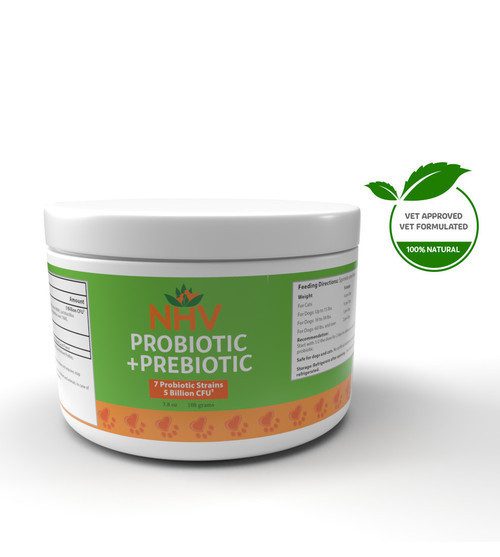
Vet-formulated. Helps with gut, immune, and anxiety support
buy 2 and save $3
4 month supply for a small to medium size pet.
What is it?
NHV Prebiotics + Probiotics for cats helps keep the GI tract healthy and, thus, contributes to your kitty’s overall health. It contains 7 strains of human-grade probiotics, and each scoop has 5 Billion CFU (Colony Forming Units - amount of active good bacteria).
How Does it Work?
Why Should I Trust It?
Proprietary blend designed and vet-formulated for your cat’s consumption.

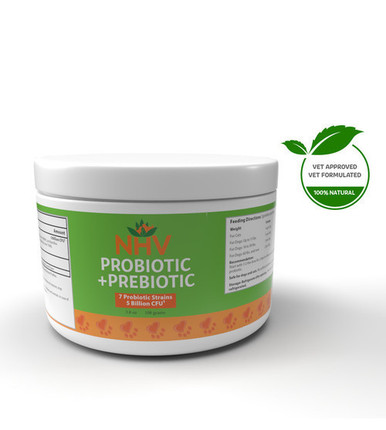
What is it?
NHV Prebiotics + Probiotics for cats helps keep the GI tract healthy and, thus, contributes to your kitty’s overall health. It contains 7 strains of human-grade probiotics, and each scoop has 5 Billion CFU (Colony Forming Units - amount of active good bacteria).
How Does it Work?
Why Should I Trust It?
Proprietary blend designed and vet-formulated for your cat’s consumption.

Did you know your cat’s gut health is a key factor in their overall well-being? NHV Prebiotics + Probiotics for cats may be a valuable addition to your kitty’s regimen because it helps keep the GI tract healthy and, thus, contributes to your kitty’s overall health. The proprietary blend is designed and vet-formulated for your cat’s consumption. It contains 7 strains of human-grade probiotics, and each scoop has 5 Billion CFU (Colony Forming Units - amount of active good bacteria).
Addressing potential concerns before they become a problem is always a good idea. As pet parents, the wellness of our sweet furkids is of the highest importance. Even when they don’t have any current health concerns, it's natural for us to seek proactive measures to maintain their optimal health. NHV supplements, like our Probiotics + Prebiotics for cats, may just be what you need.
This formula, containing 7 shelf-stable, soil-based, spore-forming probiotics, helps keep your kitty’s digestive system in tip-top shape. The probiotic strains include Bacillus coagulans LBSC, Bacillus subtilis PLSSC, Bacillus clausii 088AE, Lactobacillus acidophilus 033AE, Lactobacillus plantarum 022AE, Lactobacillus casei 118AE, and Saccharomyces boulardii SBSC.
Probiotics are formed by “good” bacteria and are well-known for improving digestive and cat gut health. These natural ingredients also help other aspects of your pet’s body work well and restore balance.
The live microorganisms, like bacteria and yeast, in probiotics can potentially restore gut microbiota, the natural microorganisms in a healthy gut. These beneficial bacteria are crucial in supporting the digestive tract and addressing digestive problems (e.g., IBS, diarrhea, constipation). Our vet added 7 strains of probiotics (5 Billion CFU per scoop) to help optimize gut health in different ways.
Their ability to add good bacteria to the pet’s body may help improve the immune system. These bacteria act as a defense mechanism against pathogens, potentially preventing the onset of significant diseases.
When the gut is swollen, it can make your cat more anxious or stressed. This happens because there are lots of nerves connecting the gut and the brain. So, a healthy gut is important for a happy and calm kitty.
Unlike probiotics, prebiotics are carbohydrates that induce the growth of good bacteria.
Our probiotic formulation is expertly formulated and has added pumpkin and carrot powder to help enhance absorption.
At NHV, we care. From sourcing and manufacturing to delivering the final products to your doorstep, our team ensures everything is done with the highest quality. What does it mean? It means that our formulations are all backed by research. And none of them contains any artificial additives, preservatives, or coloring. They're GMP-certified full-spectrum extracts made in an FDA-registered facility.
You can read more about how we formulate our products here.
Don’t worry. Even if your kitty is a picky eater, administrating NHV supplements is fairly easy. Since it is liquid-based, you can add the dosage to their daily meal favorite treat or directly squirt it in their cheek pocket.
If you have any questions about our probiotics supplement, your kitty’s gut health, or anything else in the world of pet wellness, please don’t hesitate to reach out!
Order NHV Prebiotics & Probiotics for Cats now to support your beloved sweetie’s health!
If your kitty is struggling with GI issues, you may also consider our TumFlora for Cats to help improve your cat’s natural intestinal flora and ease IBS symptoms.
In addition to natural supplements like ours, some foods contain rich probiotics. For example, plain, low-fat yogurt and fermented vegetables like kimchi are both recommended as probiotic-filled foods. However, before making any changes to your furkid’s diet, please remember to consult a vet first.
Probiotics
Prebiotics
Inactive Ingredients: Improve supplement absorption
For dogs: by weight
For cats: ¼ scoop per day. (SIX months supply)
How to Administer
Sprinkle over food. It is recommended to start with HALF the dose for 2 days to allow your little one to acclimate to the probiotic.
Product Storage
All NHV Natural Pet Products contain no artificial additives, preservatives, or chemicals. The shelf life after opening is SIX months, and must be refrigerated after opening.
Cautions and Contraindications: Do not use in pregnant or nursing animals. Speak to your vet before using our products. A second visit is recommended if your pet’s condition does not improve, or deteriorates after continued use of the supplements.
Did you know your cat’s gut health is a key factor in their overall well-being? NHV Prebiotics + Probiotics for cats may be a valuable addition to your kitty’s regimen because it helps keep the GI tract healthy and, thus, contributes to your kitty’s overall health. The proprietary blend is designed and vet-formulated for your cat’s consumption. It contains 7 strains of human-grade probiotics, and each scoop has 5 Billion CFU (Colony Forming Units - amount of active good bacteria).
Addressing potential concerns before they become a problem is always a good idea. As pet parents, the wellness of our sweet furkids is of the highest importance. Even when they don’t have any current health concerns, it's natural for us to seek proactive measures to maintain their optimal health. NHV supplements, like our Probiotics + Prebiotics for cats, may just be what you need.
This formula, containing 7 shelf-stable, soil-based, spore-forming probiotics, helps keep your kitty’s digestive system in tip-top shape. The probiotic strains include Bacillus coagulans LBSC, Bacillus subtilis PLSSC, Bacillus clausii 088AE, Lactobacillus acidophilus 033AE, Lactobacillus plantarum 022AE, Lactobacillus casei 118AE, and Saccharomyces boulardii SBSC.
Probiotics are formed by “good” bacteria and are well-known for improving digestive and cat gut health. These natural ingredients also help other aspects of your pet’s body work well and restore balance.
The live microorganisms, like bacteria and yeast, in probiotics can potentially restore gut microbiota, the natural microorganisms in a healthy gut. These beneficial bacteria are crucial in supporting the digestive tract and addressing digestive problems (e.g., IBS, diarrhea, constipation). Our vet added 7 strains of probiotics (5 Billion CFU per scoop) to help optimize gut health in different ways.
Their ability to add good bacteria to the pet’s body may help improve the immune system. These bacteria act as a defense mechanism against pathogens, potentially preventing the onset of significant diseases.
When the gut is swollen, it can make your cat more anxious or stressed. This happens because there are lots of nerves connecting the gut and the brain. So, a healthy gut is important for a happy and calm kitty.
Unlike probiotics, prebiotics are carbohydrates that induce the growth of good bacteria.
Our probiotic formulation is expertly formulated and has added pumpkin and carrot powder to help enhance absorption.
At NHV, we care. From sourcing and manufacturing to delivering the final products to your doorstep, our team ensures everything is done with the highest quality. What does it mean? It means that our formulations are all backed by research. And none of them contains any artificial additives, preservatives, or coloring. They're GMP-certified full-spectrum extracts made in an FDA-registered facility.
You can read more about how we formulate our products here.
Don’t worry. Even if your kitty is a picky eater, administrating NHV supplements is fairly easy. Since it is liquid-based, you can add the dosage to their daily meal favorite treat or directly squirt it in their cheek pocket.
If you have any questions about our probiotics supplement, your kitty’s gut health, or anything else in the world of pet wellness, please don’t hesitate to reach out!
Order NHV Prebiotics & Probiotics for Cats now to support your beloved sweetie’s health!
If your kitty is struggling with GI issues, you may also consider our TumFlora for Cats to help improve your cat’s natural intestinal flora and ease IBS symptoms.
In addition to natural supplements like ours, some foods contain rich probiotics. For example, plain, low-fat yogurt and fermented vegetables like kimchi are both recommended as probiotic-filled foods. However, before making any changes to your furkid’s diet, please remember to consult a vet first.
Probiotics
Prebiotics
Inactive Ingredients: Improve supplement absorption
For dogs: by weight
For cats: ¼ scoop per day. (SIX months supply)
How to Administer
Sprinkle over food. It is recommended to start with HALF the dose for 2 days to allow your little one to acclimate to the probiotic.
Product Storage
All NHV Natural Pet Products contain no artificial additives, preservatives, or chemicals. The shelf life after opening is SIX months, and must be refrigerated after opening.
Cautions and Contraindications: Do not use in pregnant or nursing animals. Speak to your vet before using our products. A second visit is recommended if your pet’s condition does not improve, or deteriorates after continued use of the supplements.
Published: June 17, 2024